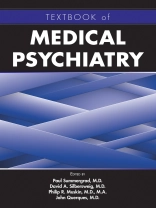The Textbook of Medical Psychiatry was written for the wide range of clinicians who grapple with the diagnostic and treatment challenges inherent in this clinical reality: medical and psychiatric illnesses do not occur in isolation from one another. Because assessment in these cases may be challenging, the book addresses general medical conditions that directly cause psychiatric illness and the medical differential diagnosis of common psychiatric illnesses. In addition, the book describes how the presentation and treatment of both psychiatric and medical disorders are modified by the presence of comorbid conditions. The editors, who are at the forefront of the field, have assembled an outstanding group of contributors, all of whom share the objective of helping psychiatrists, internists, neurologists, trainees, and other health care providers recognize the medical issues facing patients with psychiatric symptoms, and vice versa. Proper assessment and treatment are dependent on the skillful application of this knowledge.
Written in down-to-earth, clinically grounded prose, this text Provides a comprehensive exploration of approaches to the patient, including perspectives from internists and neurologists on dealing with diagnostic uncertainty and special chapters on the neurological examination, cognitive testing, neuroimaging, laboratory testing, and toxicological syndromes. Presents a review of medical disorders that can directly or indirectly affect the clinical presentation and course of psychiatric disorders. Presents a review of psychiatric disorders that can be caused by medical illnesses or affect the clinical presentation and course of medical disorders. Includes chapters on pain, insomnia, and somatoform disorders, conditions that accompany many psychiatric and medical illnesses and that fall in the boundary between these practice settings.
In clinics and offices every day, physicians encounter patients whose presentations are atypical or whose symptoms are not responsive to usual care. When facing the challenges of accurately assessing complicated symptoms and managing the care of complex patients, clinicians often seek advice from colleagues whose perspectives and expertise they trust. The chapters in the Textbook of Medical Psychiatry can be consulted in much the same fashion, expanding clinicians’ knowledge base and helping them to more effectively diagnose and care for their patients.
İçerik tablosu
Contributors Foreword Introduction: The Importance of Medical–Psychiatric Illness Part I: Approach to the Patient Chapter 1. An Internist’s Approach to the Neuropsychiatric Patient Chapter 2. The Neurological Examination for Neuropsychiatric Assessment Chapter 3. The Bedside Cognitive Examination in Medical Psychiatry Chapter 4. Neuroimaging, Electroencephalography, and Lumbar Puncture in Medical Psychiatry Chapter 5. Toxicological Exposures and Nutritional Deficiencies in the Psychiatric Patient Part II: Psychiatric Considerations in Medical Disorders Chapter 6. Cardiovascular Disease Chapter 7. Endocrine Disorders and Their Psychiatric Manifestations Chapter 8. Inflammatory Diseases and Their Psychiatric Manifestations Chapter 9. Infectious Diseases and Their Psychiatric Manifestations Chapter 10. Gastroenterological Disease in Patients With Psychiatric Disorders Chapter 11. Renal Disease in Patients With Psychiatric Illness Chapter 12. Neurological Conditions and Their Psychiatric Manifestations Chapter 13. Cancer: Psychiatric Care of the Oncology Patient Chapter 14. Dermatology: Psychiatric Considerations in the Medical Setting Chapter 15. Women’s Mental Health and Reproductive Psychiatry Part III: Medical Considerations in Psychiatric Disorders Chapter 16. Neurodevelopmental Disorders Chapter 17. Psychotic Disorders Due to Medical Illnesses Chapter 18. Catatonia in the Medically Ill Patient Chapter 19. Mood Disorders Due to Medical Illnesses Chapter 20. Anxiety and Related Disorders: Manifestations in the General Medical Setting Chapter 21. Substance Use Disorders in the Medical Setting Chapter 22. Neurocognitive Disorders Part IV: Conditions and Syndromes at the Medical–Psychiatric Boundary Chapter 23. Chronic Pain Chapter 24. Insomnia Chapter 25. Somatic Symptom and Related Disorders Index
Yazar hakkında
Paul Summergrad, M.D., is Dr. Frances S. Arkin Professor and Chairman of the Department of Psychiatry, and Professor of Psychiatry and Medicine, at Tufts University School of Medicine, as well as Psychiatrist-in-Chief of Tufts Medical Center, in Boston, Massachusetts.David A. Silbersweig, M.D., is Stanley Cobb Professor of Psychiatry at Harvard Medical School and Chairman of the Department of Psychiatry, as well as Co-Director of the Center for the Neurosciences at Brigham and Women’s Hospital in Boston, Massachusetts.Philip R. Muskin, M.D., M.A., is Professor of Psychiatry and Senior Consultant in Consultation-Liaison Psychiatry at Columbia University Medical Center, in the Department of Psychiatry at Columbia University Vagelos College of Physicians and Surgeons in New York, New York.John Querques, M.D., is Vice Chairman for Hospital Services in the Department of Psychiatry at Tufts Medical Center and Associate Professor of Psychiatry at Tufts University School of Medicine in Boston, Massachusetts.










